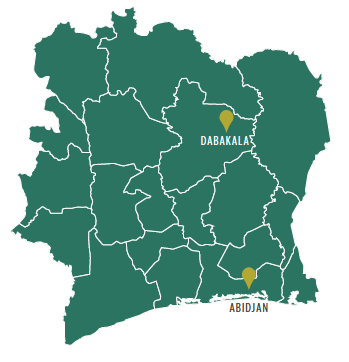
The ‘Just Gold’ EU-funded project is the first to trace responsible artisanal gold from the mine-site to the international market following global standards.
For the first time in Côte d’Ivoire, gold has been exported from the mine-site to the international market in full compliance with the ‘traceability and due diligence system’. This assures consumers that the gold they buy is from a responsible source (i.e. there are no incidents of child labour, unsafe working conditions, lack of environmental standards or financial crimes) and can be traced to its origin. A 755 gram gold ingot mined in Dabakala was traced to Abidjan, where the exporter is located, with full due diligence completed on the supply chain. The gold was exported complying with all legal requirements to an authorized European refiner.
The artisanal gold sector in Côte d’Ivoire is growing, as the country is currently the 7th largest gold producer in Africa. However, over 240 illegal gold mining sites are estimated to operate across the country, employing tens of thousands of unlicensed miners. This not only affects the country’s GDP with losses estimated at € 730.5 million per year, but it also fosters forced and child labour in mine sites.
This first traceable export of artisanal gold is a major turning point for people and businesses in artisanal mining in the country. They now have new opportunities to sell their products on the international market, while ensuring labour rights are respected.
This was made possible thanks to the Just Gold EU-funded project through the Instrument contributing to Stability and Peace. The project supports artisanal gold miners, a mining cooperative in the department of Dabakala (Hambol region), traders, and exporters to ensure artisanal gold in Côte d’Ivoire is produced and sold according to international standards.
The Just Gold project offers incentives for artisanal gold miners to channel their products to legal exporters—and eventually responsible consumers. It provides evidence of traceability allowing international buyers to track their gold to the mine site it was extracted from. At the same time, it supports private sector actors to complete due diligence on their supply chain to identify, mitigate, and publicly report risks such as human rights abuses, forced and child labour and corruption.
“The Just Gold project offers Côte d'Ivoire unexplored opportunities for economic activity and development. These days consumers and the private sector are paying more attention to the conditions in which their products are manufactured and when they purchase gold, they want to be sure it isn’t tied to illicit trade or human rights violations. The Ivorian government recognizes the importance of due diligence in contributing to sustainable development and increasing artisanal gold production, and is taking important steps in this direction. This is even more important given that under new European regulations coming into force in 2021, European importers of minerals like gold will be required to complete due diligence on their supply chain," said Mr. Jobst von Kirchmann, Ambassador of the European Union in Côte d'Ivoire.
This is a first step in contributing to a commercially viable, scalable and sustainable traceability and due diligence system in the artisanal gold supply chain in Côte d'Ivoire. Based on this first successful example, others may follow suit.
For further information:
EU-funded Just Gold project (FR)
Details
- Publication date
- 26 November 2020
- Author
- Service for Foreign Policy Instruments
